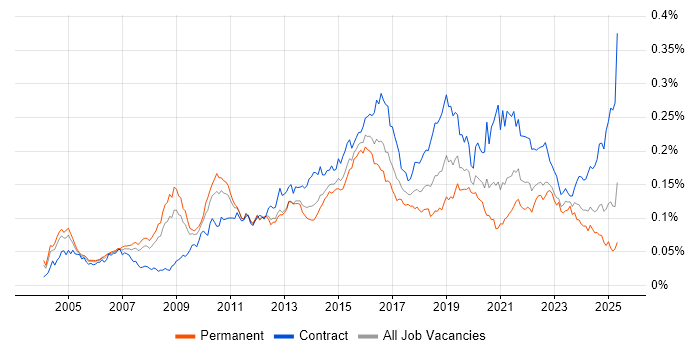Integration Architect
UK > England
The median Integration Architect salary in England is £90,000 per year, according to job vacancies posted during the 6 months leading to 14 May 2025.
The table below provides salary benchmarking and summary statistics, comparing them to the same period in the previous two years.
| 6 months to 14 May 2025 |
Same period 2024 | Same period 2023 | |
|---|---|---|---|
| Rank | 672 | 770 | 849 |
| Rank change year-on-year | +98 | +79 | +164 |
| Permanent jobs requiring an Integration Architect | 17 | 61 | 87 |
| As % of all permanent jobs advertised in England | 0.035% | 0.071% | 0.097% |
| As % of the Job Titles category | 0.038% | 0.075% | 0.11% |
| Number of salaries quoted | 13 | 37 | 57 |
| 10th Percentile | £71,500 | £62,500 | £73,500 |
| 25th Percentile | £77,500 | £68,750 | £82,500 |
| Median annual salary (50th Percentile) | £90,000 | £72,500 | £92,500 |
| Median % change year-on-year | +24.14% | -21.62% | +13.85% |
| 75th Percentile | £105,000 | £82,500 | £107,500 |
| 90th Percentile | £107,500 | £93,750 | £122,500 |
| UK median annual salary | £95,000 | £72,500 | £92,500 |
| % change year-on-year | +31.03% | -21.62% | +15.63% |
All Permanent IT Job Vacancies
England
For comparison with the information above, the following table provides summary statistics for all permanent IT job vacancies in England. Most job vacancies include a discernible job title that can be normalized. As such, the figures in the second row provide an indication of the number of permanent jobs in our overall sample.
| Permanent vacancies in England with a recognized job title | 44,309 | 80,989 | 82,470 |
| % of permanent jobs with a recognized job title | 90.72% | 94.48% | 91.56% |
| Number of salaries quoted | 24,260 | 60,410 | 52,484 |
| 10th Percentile | £30,000 | £28,500 | £32,500 |
| 25th Percentile | £41,250 | £38,250 | £45,000 |
| Median annual salary (50th Percentile) | £57,500 | £53,500 | £60,800 |
| Median % change year-on-year | +7.48% | -12.01% | +1.33% |
| 75th Percentile | £75,000 | £71,613 | £82,500 |
| 90th Percentile | £97,500 | £91,250 | £100,000 |
| UK median annual salary | £56,500 | £52,500 | £60,000 |
| % change year-on-year | +7.62% | -12.50% | - |
Integration Architect
Job Vacancy Trend in England
Job postings that featured Integration Architect in the job title as a proportion of all IT jobs advertised in England.

Integration Architect
Salary Trend in England
3-month moving average salary quoted in jobs citing Integration Architect in England.
Integration Architect
Salary Histogram in England
Salary distribution for jobs citing Integration Architect in England over the 6 months to 14 May 2025.
Integration Architect
Job Locations in England
The table below looks at the demand and provides a guide to the median salaries quoted in IT jobs citing Integration Architect within the England region over the 6 months to 14 May 2025. The 'Rank Change' column provides an indication of the change in demand within each location based on the same 6 month period last year.
| Location | Rank Change on Same Period Last Year |
Matching Permanent IT Job Ads |
Median Salary Past 6 Months |
Median Salary % Change on Same Period Last Year |
Live Jobs |
|---|---|---|---|---|---|
| London | +82 | 8 | £97,500 | +36.37% | 17 |
| North of England | +46 | 5 | £95,000 | +18.75% | 5 |
| North West | +4 | 5 | £95,000 | +18.75% | 3 |
| Midlands | +62 | 3 | £80,000 | -0.62% | 3 |
| West Midlands | +56 | 3 | £80,000 | -0.62% | 3 |
| Integration Architect UK |
|||||
Integration Architect Skill Set
Top 30 Co-occurring Skills and Capabilities in England
For the 6 months to 14 May 2025, Integration Architect job roles required the following skills and capabilities in order of popularity. The figures indicate the absolute number co-occurrences and as a proportion of all permanent job ads across the England region featuring Integration Architect in the job title.
|
|
Integration Architect Skill Set
Co-occurring Skills and Capabilities in England by Category
The follow tables expand on the table above by listing co-occurrences grouped by category. The same employment type, locality and period is covered with up to 20 co-occurrences shown in each of the following categories:
|
|
|||||||||||||||||||||||||||||||||||||||||||||||||||||||||||||||||||||||||||
|
|
|||||||||||||||||||||||||||||||||||||||||||||||||||||||||||||||||||||||||||
|
|
|||||||||||||||||||||||||||||||||||||||||||||||||||||||||||||||||||||||||||
|
|
|||||||||||||||||||||||||||||||||||||||||||||||||||||||||||||||||||||||||||
|
|
|||||||||||||||||||||||||||||||||||||||||||||||||||||||||||||||||||||||||||
|
|
|||||||||||||||||||||||||||||||||||||||||||||||||||||||||||||||||||||||||||
|
||||||||||||||||||||||||||||||||||||||||||||||||||||||||||||||||||||||||||||
